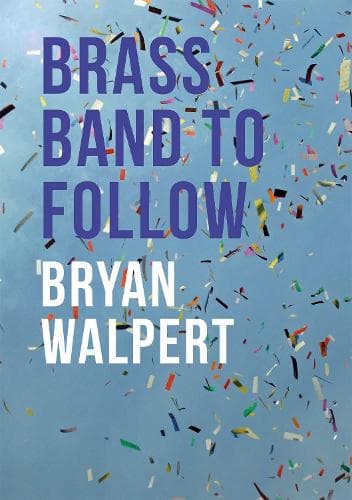Review: Brass Band to Follow
Reviewed by Paula Green
Bryan Walpert, professor of creative writing at Massey University, has published three previous poetry collections. His fourth, Brass Band to Follow, is a rewarding read with distinctive tones and exquisite layers. The book’s opening quotes suggest we are entering poetic engagements with middle age. Yes, age is a visible concern but the poems are alive with movement that includes but stretches beyond time passing.
The book is thoughtfully structured: you move in and out of dense single-verse poems along with airy multi-versed examples. A rocky outcrop on one page, thistle kisses on the next. It is like listening to music that favours both solo violin and the greater orchestra.
The terrific opening poem, Begin with, reads like stream-of-conscious talk, the poet addressing both himself (you) and the reader (you) as he searches for a starting point (the moon, a vegetable, a carrot, kohlrabi). It is witty but it is also a template for the poetry to come, poems that relish closeness and distance in equal measure. The opening poem packages the beauty moon and a soil-clad carrot, intruding family routines, startling images (the bugs attracted to the light “smatter the ceiling like the inverse of stars”), an ongoing commentary.
Walpert is a fidgety poet as he questions, resets, interrogates his poetic choices. I love this. More than anything, he is acutely aware of words, their appropriateness, their reverberation, their flexibility. In the delightfully playful Prompted, he must use 12 words in a poem, like a creative-writing exercise, with the reader guessing each word. The elasticity, the aptness of words is placed under a spotlight but Walpert offers a characteristic twist, and the poem swerves to frame an absence:
This is the sort of poem where we imagine
how you’d read this if you still lived with me
in the house by the church with the poplar
shedding its leaves in sudden small eruptions,
like laughter. How your very tone,
like the angle of light those Sunday mornings,
would suggest the shift in season,
how your tongue would roll around these words
like the orbit of a distant rock. Ten o’clock again.
Screw Keats. Forlorn, forlorn, forlorn.
Expect to pause in the midst of movement. Walpert will slow right down to focus upon an object (a stone, a razor, a full stop, laundry). He uses objects to add shade and light to stories, personal circumstances, imaginings. Nothing can be taken at face value. In Of the full stop, he gets us peering at a punctuation mark that might seem “perfectly shaped” but is as thread-rich as a shirt. It might:
appear at first blush
an unbroken broad cloth
but might yet be unwoven,
while one scrawled by pencil
is revealed through that lens
to be as unformed
as any story
whose expression
it might yet not be
too late not to draw
to a close.
It feels like a disservice extracting a quote from the poems when Walpert’s poetry offers interdependent intricacies, in both the poem and the collection as a whole. One captivating theme delivers the complexity of love. In the first section love is retrieved from the past, absent and distant, like the recurring moon, the fickle weather. Two sumptuous longer sequences borrow the 17th century language of Robert Hooke and Robert Boyle to draw love closer. Native trees replay a love story. The final poem, Brass Band to Follow, returns to the preoccupations of the opening poem: there is nearness and distance, the children, a physical scene, the fertile connections. Yet it feels different, as though affected by passages through time and experience, musings and meanderings, middle age.
(…) Then the silvered metal
of the truck at last in which my son sits,
looking suddenly uncertain, like someone
staring down at a meal he is unsure
he has ordered in a country whose
language he does not yet speak,
while my wife and I wave and wave
and wait, like him, for all that has been
forecast to be fulfilled, for what
has been written to come, to pass.
Walpert’s fourth collection is a glorious summoning of the power of words to unsettle, soothe, divert, translate. It is deeply personal, intellectually agile and a stimulating read.
Reviewed by Paula Green
